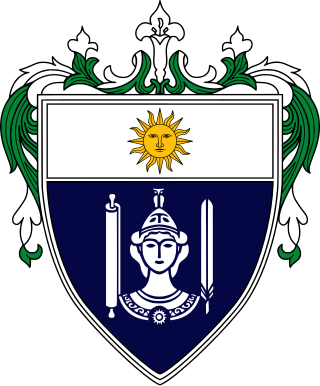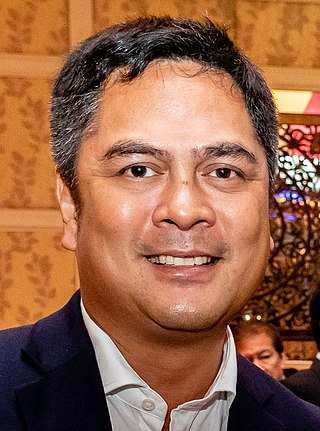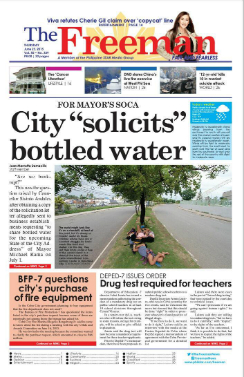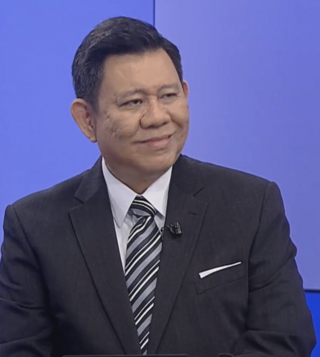Related Research Articles

The Philippines, officially the Republic of the Philippines, is an archipelagic country in Southeast Asia. In the western Pacific Ocean, it consists of 7,641 islands which are broadly categorized in three main geographical divisions from north to south: Luzon, Visayas, and Mindanao. The Philippines is bounded by the South China Sea to the west, the Philippine Sea to the east, and the Celebes Sea to the south. It shares maritime borders with Taiwan to the north, Japan to the northeast, Palau to the east and southeast, Indonesia to the south, Malaysia to the southwest, Vietnam to the west, and China to the northwest. It is the world's twelfth-most-populous country, with diverse ethnicities and cultures. Manila is the country's capital, and its most populated city is Quezon City; both are within Metro Manila.

The University of the Philippines Los Baños, also referred to as UP Los Baños or colloquially as Elbi, is a public research university primarily located in the towns of Los Baños and Bay in the province of Laguna, some 65 kilometers southeast of Manila. It traces its roots to the UP College of Agriculture (UPCA), which was founded in 1909 by the American colonial government to promote agricultural education and research in the Philippines. American botanist Edwin Copeland served as its first dean. UPLB was formally established in 1972 following the union of UPCA with four other Los Baños and Diliman-based University of the Philippines (UP) units.

The University of Santo Tomas (UST), officially the Pontifical and Royal University of Santo Tomas, Manila, is a private, Catholic research university in Manila, Philippines. Founded on April 28, 1611, by Spanish friar Miguel de Benavides, third Archbishop of Manila, it has the oldest extant university charter in Asia and is one of the world's largest Catholic universities in terms of enrollment found on one campus. It is the main campus of the University of Santo Tomas System that is run by the Order of Preachers.

Maria Angelita Ressa is a Filipino and American journalist. She is the co-founder and CEO of Rappler. She previously spent nearly two decades working as a lead investigative reporter in Southeast Asia for CNN. She will become Professor of Professional Practice in the School of International and Public Affairs at Columbia University on July 1, 2024, and will be a Distinguished Fellow at Columbia's new Institute of Global Politics beginning in the fall of 2023.

This article covers the history of the current Philippine republican state following the 1986 People Power Revolution, known as the Fifth Philippine Republic.

The Varsitarian is the official student publication of the University of Santo Tomas (UST). Founded in January 1928 by a group of students led by Jose Villa Panganiban, it is one of the first student newspapers in the Philippines. It is published fortnightly. The lampoon issue is called The Vuisitarian. Tomas U. Santos, the mascot of The Varsitarian, is a Thomasian who represents the students of the campus. He is usually seen accompanied by a talking, and quite cynical, T-square.
Louie Jon Agustin Sanchez, a poet, fiction writer, critic, and journalist, hails from Flora, Apayao, Philippines. He lives in Novaliches, Caloocan, in Metro Manila.

The University of Santo Tomas Faculty of Arts and Letters, popularly known as "UST Artlets" or "UST AB", is the liberal arts school of the University of Santo Tomas, the oldest and the largest Catholic university in Manila, Philippines.

Mass media in the Philippines consists of several types of media: television, radio, newspapers, magazines, cinema, and websites.
The Bohol Chronicle, popularly known as the Chronicle, is a daily newspaper in Bohol, Philippines. It also hosted a radio station at DYRD-AM 1161 AM.
Amod is a Bengali weekly newspaper published in Comilla, Bangladesh. The long-running community newspaper claims to be the oldest weekly newspaper in the country as it has been published since 5 May 1955.

Jose Ruperto Martin Marfori Andanar is a Filipino television news personality, news anchor, radio commentator, podcaster, voice-over artist and a columnist. He served as the secretary of the Presidential Communications Office of the Philippines under the Duterte administration.

The Freeman is a daily English-language newspaper published in Cebu, Philippines. It is the longest-running newspaper in Cebu, first published on May 10, 1919. Since 2004, the newspaper has been published by the Philstar Media Group, publisher of the Manila-based newspaper, The Philippine STAR, with former owner Jose "Dodong" Gullas retaining editorial control over the newspaper. The motto of the newspaper is "Fair and fearless".
Asian Media Information and Communication Centre (AMIC) is an international non-government organization (NGO) whose mission is to promote communication research and education and to facilitate dialogue on media ethics, information policy, and knowledge management among academic, industry, government, and civil society in the Asia-Pacific region.

Julio Cabral Teehankee is a Filipino political scientist. He is Full Professor of Political Science and International Studies at De La Salle University (DLSU) where he served as Chair of the Political Science Department (1994–2007); Chair of the International Studies Department (2008–2013); and Dean of the College of Liberal Arts (2013–2017).
Vera Files is a non-profit online news organization in the Philippines, known for its institutionalized role in fact-checking false information in the Philippines, and as one of the news organizations most prominently targetted by intimidation and censorship due to its critical coverage of the Philippine government. It is part of the International Fact-Checking Network of the Poynter Institute and is one of Facebook's two Philippine partners in its third-party fact-checking program.
Jose ("Joe") Guevara was a Filipino journalist, political commentator and art collector. Guevara was born in Tanauan, Batangas and earned his pre-law and law degrees at University of Santo Tomas, and later earned a master's degree in journalism from the same university. He began his career in journalism in 1938 as the editor-in-chief of The Varsitarian, the student newspaper at his university. He briefly worked as an attorney in the law office of Jose P. Laurel, who was later president of the Philippines, before returning to journalism.
Florangel Rosario-Braid is a Filipina writer, educator, and constitutionalist, who was a member of the Philippine Constitutional Commission of 1986. She served as president and executive dean, currently president emeritus of the Asian Institute of Journalism and Communication (AIJC).
Apoy sa Lupang Hinirang is a 1990 Philippine political drama action film directed by Mauro Gia Samonte. The film stars Jestoni Alarcon, Rina Reyes and Bernard Bonnin.
Christian Esguerra is a Filipino political journalist and educator. He currently hosts Facts First, a political podcast streaming live three times a week, where he tackles current issues in politics and governance. A persistent critic of disinformation activities, Esguerra was the former anchor and managing editor of the political talk program After the Fact on ABS-CBN News Channel (ANC), launched in May 2020. He started his career in journalism as a reporter for the Philippine Daily Inquirer in 2000, and joined ABS-CBN in 2015 as a news correspondent and anchor.
References
- ↑ Maslog, Crispin (2007). Philippine Communication Today. Manila: New Day Publishers. p. 484. ISBN 9789711011673 . Retrieved 30 March 2021.
- ↑ Manahan, Job Anthony (26 March 2018). "Defy Duterte's 'assault' on democracy – Crispin Maslog". No. Online. The Varsitarian. The Varsitarian. Retrieved 30 March 2021.
- ↑ Biong, Ali Ian Marcelino (27 March 2018). "Veteran journo: Duterte, media should adjust to each other". The Flame. The Flame. Retrieved 30 March 2021.
- ↑ Eco-Business. "Chair of the Board: Crispin Maslog". Eco-Business. Eco-Business. Retrieved 30 March 2021.
{{cite web}}:|last1=has generic name (help) - ↑ China Dialogue. "Crispin Maslog". China Dialogue. China Dialogue Trust. Retrieved 30 March 2021.
- ↑ IREX. "Crispin Maslog". IREX. IREX Europe. Retrieved 30 March 2021.
- ↑ Maslog, Crispin C (1985). 5 Successful Asian Community Newspapers. United Nations Educational, Scientific and Cultural Organization, Asian Mass Communication Research and Information Centre. p. 136. ISBN 9789971905217.
- ↑ Maslog, Crispin C. (1994). The Metro Manila Press. Philippine Press Institute with funding from Konrad Adenauer Foundation. p. 109. ISBN 9789718703106.
- ↑ Maslog, Crispin (1993). The Rise and Fall of Philippine Community Newspapers. Philippine Press Institute with funding from Konrad Adenauer Foundation. p. 206. ISBN 9789718703090.
- ↑ Maslog, Crispin C. (1992). Communication, Values, and Society. University of Michigan. p. 386. ISBN 9789718703083.
- ↑ Maslog, Crispin (1990). Campus Stylebook: A Guide to Writing & Editing for Popular Publications. University of the Philippines, Los Baños. p. 68. ISBN 9789711100865.
- ↑ Maslog, Crispin C. (1990). Philippine Mass Communication: (a Mini-history). New Day Publishers. p. 52. ISBN 9789711003838.
- ↑ Maslog, Crispin C. The Dragon Slayer of the Countryside. Philippine Press Institute. p. 108. ISBN 9789711100735.
- ↑ Maslog, Crispin (1988). Philippine Communication: An Introduction. University of California. p. 375. ISBN 9789711100612.
- ↑ Maslog, Crispin C (1986). People Power & Communication. University of Michigan. p. 71.
- ↑ Maslog, Crispin (1985). Philippine Communication Curriculum: How, why & what for. University of Michigan. p. 52.